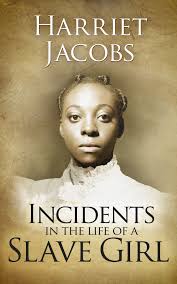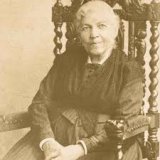Incidents in the Life of a Slave Girl Page #16
Incidents in the Life of a Slave Girl, written by herself is an autobiography by Harriet Jacobs, a mother and fugitive slave, published in 1861 by L. Maria Child, who edited the book for its author. Jacobs used the pseudonym Linda Brent.
I could tell of more slaveholders as cruel as those I have described. They are not exceptions to the general rule. I do not say there are no humane slaveholders. Such characters do exist, notwithstanding the hardening influences around them. But they are "like angels' visits--few and far between." I knew a young lady who was one of these rare specimens. She was an orphan, and inherited as slaves a woman and her six children. Their father was a free man. They had a comfortable home of their own, parents and children living together. The mother and eldest daughter served their mistress during the day, and at night returned to their dwelling, which was on the premises. The young lady was very pious, and there was some reality in her religion. She taught her slaves to lead pure lives, and wished them to enjoy the fruit of their own industry. Her religion was not a garb put on for Sunday, and laid aside till Sunday returned again. The eldest daughter of the slave mother was promised in marriage to a free man; and the day before the wedding this good mistress emancipated her, in order that her marriage might have the sanction of law. Report said that this young lady cherished an unrequited affection for a man who had resolved to marry for wealth. In the course of time a rich uncle of hers died. He left six thousand dollars to his two sons by a colored woman, and the remainder of his property to this orphan niece. The metal soon attracted the magnet. The lady and her weighty purse became his. She offered to manumit her slaves--telling them that her marriage might make unexpected changes in their destiny, and she wished to insure their happiness. They refused to take their freedom, saying that she had always been their best friend, and they could not be so happy any where as with her. I was not surprised. I had often seen them in their comfortable home, and thought that the whole town did not contain a happier family. They had never felt slavery; and, when it was too late, they were convinced of its reality. When the new master claimed this family as his property, the father became furious, and went to his mistress for protection. "I can do nothing for you now, Harry," said she. "I no longer have the power I had a week ago. I have succeeded in obtaining the freedom of your wife; but I cannot obtain it for your children." The unhappy father swore that nobody should take his children from him. He concealed them in the woods for some days; but they were discovered and taken. The father was put in jail, and the two oldest boys sold to Georgia. One little girl, too young to be of service to her master, was left with the wretched mother. The other three were carried to their master's plantation. The eldest soon became a mother; and when the slaveholder's wife looked at the babe, she wept bitterly. She knew that her own husband had violated the purity she had so carefully inculcated. She had a second child by her master, and then he sold her and his offspring to his brother. She bore two children to the brother and was sold again. The next sister went crazy. The life she was compelled to lead drove her mad. The third one became the mother of five daughters. Before the birth of the fourth the pious mistress died. To the last, she rendered every kindness to the slaves that her unfortunate circumstances permitted. She passed away peacefully, glad to close her eyes on a life which had been made so wretched by the man she loved. This man squandered the fortune he had received, and sought to retrieve his affairs by a second marriage; but, having retired after a night of drunken debauch, he was found dead in the morning. He was called a good master; for he fed and clothed his slaves better than most masters, and the lash was not heard on his plantation so frequently as on many others. Had it not been for slavery, he would have been a better man, and his wife a happier woman. No pen can give an adequate description of the all-pervading corruption produced by slavery. The slave girl is reared in an atmosphere of licentiousness and fear. The lash and the foul talk of her master and his sons are her teachers. When she is fourteen or fifteen, her owner, or his sons, or the overseer, or perhaps all of them, begin to bribe her with presents. If these fail to accomplish their purpose, she is whipped or starved into submission to their will. She may have had religious principles inculcated by some pious mother or grandmother, or some good mistress; she may have a lover, whose good opinion and peace of mind are dear to her heart; or the profligate men who have power over her may be exceedingly odious to her. But resistance is hopeless. The poor worm Shall prove her contest vain. Life's little day Shall pass, and she is gone! The slaveholder's sons are, of course, vitiated, even while boys, by the unclean influences every where around them. Nor do the master's daughters always escape. Severe retributions sometimes come upon him for the wrongs he does to the daughters of the slaves. The white daughters early hear their parents quarrelling about some female slave. Their curiosity is excited, and they soon learn the cause. They are attended by the young slave girls whom their father has corrupted; and they hear such talk as should never meet youthful ears, or any other ears. They know that the woman slaves are subject to their father's authority in all things; and in some cases they exercise the same authority over the men slaves. I have myself seen the master of such a household whose head was bowed down in shame; for it was known in the neighborhood that his daughter had selected one of the meanest slaves on his plantation to be the father of his first grandchild. She did not make her advances to her equals, nor even to her father's more intelligent servants. She selected the most brutalized, over whom her authority could be exercised with less fear of exposure. Her father, half frantic with rage, sought to revenge himself on the offending black man; but his daughter, foreseeing the storm that would arise, had given him free papers, and sent him out of the state. In such cases the infant is smothered, or sent where it is never seen by any who know its history. But if the white parent is the father, instead of the mother, the offspring are unblushingly reared for the market. If they are girls, I have indicated plainly enough what will be their inevitable destiny. You may believe what I say; for I write only that whereof I know. I was twenty-one years in that cage of obscene birds. I can testify, from my own experience and observation, that slavery is a curse to the whites as well as to the blacks. It makes white fathers cruel and sensual; the sons violent and licentious; it contaminates the daughters, and makes the wives wretched. And as for the colored race, it needs an abler pen than mine to describe the extremity of their sufferings, the depth of their degradation.
Translation
Translate and read this book in other languages:
Select another language:
- - Select -
- 简体中文 (Chinese - Simplified)
- 繁體中文 (Chinese - Traditional)
- Español (Spanish)
- Esperanto (Esperanto)
- 日本語 (Japanese)
- Português (Portuguese)
- Deutsch (German)
- العربية (Arabic)
- Français (French)
- Русский (Russian)
- ಕನ್ನಡ (Kannada)
- 한국어 (Korean)
- עברית (Hebrew)
- Gaeilge (Irish)
- Українська (Ukrainian)
- اردو (Urdu)
- Magyar (Hungarian)
- मानक हिन्दी (Hindi)
- Indonesia (Indonesian)
- Italiano (Italian)
- தமிழ் (Tamil)
- Türkçe (Turkish)
- తెలుగు (Telugu)
- ภาษาไทย (Thai)
- Tiếng Việt (Vietnamese)
- Čeština (Czech)
- Polski (Polish)
- Bahasa Indonesia (Indonesian)
- Românește (Romanian)
- Nederlands (Dutch)
- Ελληνικά (Greek)
- Latinum (Latin)
- Svenska (Swedish)
- Dansk (Danish)
- Suomi (Finnish)
- فارسی (Persian)
- ייִדיש (Yiddish)
- հայերեն (Armenian)
- Norsk (Norwegian)
- English (English)
Citation
Use the citation below to add this book to your bibliography:
Style:MLAChicagoAPA
"Incidents in the Life of a Slave Girl Books." Literature.com. STANDS4 LLC, 2025. Web. 24 Feb. 2025. <https://www.literature.com/book/incidents_in_the_life_of_a_slave_girl_947>.








Discuss this Incidents in the Life of a Slave Girl book with the community:
Report Comment
We're doing our best to make sure our content is useful, accurate and safe.
If by any chance you spot an inappropriate comment while navigating through our website please use this form to let us know, and we'll take care of it shortly.
Attachment
You need to be logged in to favorite.
Log In